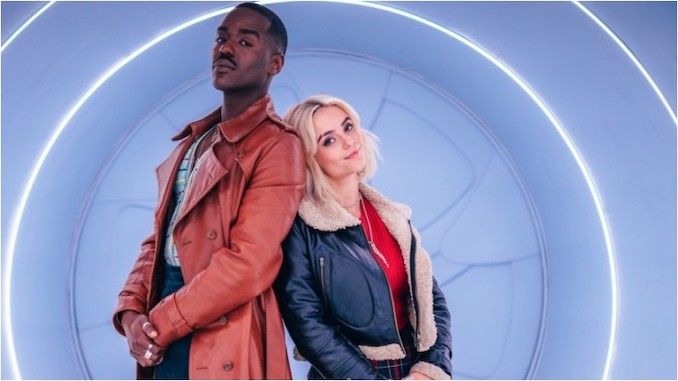On Doctor Who, Science Fiction’s Oldest Franchise Still Chooses to Lead with Hope
Showrunner Russell T. Davies and stars Ncuti Gatwa and Millie Gibson discuss keeping the 60-year-old franchise fresh and relevant in upcoming season
Photo Courtesy of Disney+
Doctor Who is remarkable for many reasons. It’s the longest-running science fiction series on television, having just celebrated its 60th anniversary last year. Its main character, a two-hearted, time-traveling alien, has been played by well over a dozen actors. And it’s launching a brand new season—its first, fourteenth, or fortieth, depending on who you ask—this spring, now on a new streaming home that will put the show in front of more viewers, globally, than ever before. But what still sets this franchise apart is that for all its longevity, all its reboots and restarts, and the foundational idea of change that’s baked into its very premise, its central thesis has always been the same: travel hopefully.
Technically, that’s one of the more famous lines spoken by Jodie Whittaker’s Thirteenth incarnation of the show’s famous Time Lord. But it’s also a fairly succinct summation of everything the show’s always been about—and the philosophy it continues to embrace in its latest outing.
“Hope is the name of the game in Doctor Who,” star Ncuti Gatwa, who plays the Fifteenth Doctor, tells Paste. “We get asked a lot what is the magic of [this show] and why it’s lasted so long. And it’s definitely that dedication to hope and joy that you really don’t see [elsewhere] on TV.”
“After all these years, as well!” Millie Gibson, who plays companion Ruby Sunday, adds. “I mean, when it first started, it was completely different and unlike anything on TV, and still, 60 years on, with all the CGI we’ve got and all the other franchises out there, it’s still got that essence. That’s its character.”
It’s an attitude that’s largely fueled by the character of the Doctor himself. Despite a history littered with trauma and loss, the Time Lord’s omnipresent wonder and unabashed joy in the universe’s—and, often, humanity’s—ability to adapt and change offer a necessary reminder that things like optimism and kindness are ideals we each have to choose to embrace. Goodness takes a surprising amount of effort, and, more often than not, holding on to hope is hard work. But it can change the world.
Russell T. Davies, current Doctor Who showrunner and the man behind the series’ return after a decade-long hiatus back in 2005, has long held that the franchise is a “fundamentally optimistic” one. That idea was part of his pitch for the show’s revival nearly 20 years ago, and it doesn’t sound like much has changed for him on that score since then.
“I think it’s so important,” he says when asked about that long-ago quote and the idea of hope at the series’ center. “I think it’s particularly relevant because Doctor Who has a large child[ren]’s audience. It’s a family show. It’s for absolutely anyone. But the fact that children sit there in the audience is very significant to me. And even back in 2005, I was very much aware that children are always being told that the world’s going to end, that global warming’s going to get us, that war’s going to get us, and my goodness, now you look at the 24 hours news streaming these days and parents having to have conversations with their children about what they watch and the information they receive. So in that world, I wanted something that was a beacon.”
In our current era of often grim and dystopian science fiction, it’s comforting that Doctor Who, as a franchise, still refuses to embrace the cynicism that powers so many other properties.
“Some shows will say, look, this [bleak future] is where we’re heading. And I think that’s fair enough: be warned, people. This could be around the corner,” Davies says. “But I think science fiction is very good at [being a beacon]. I admire Star Trek enormously and that’s what I love about the Enterprise and the Discovery and all those ships—those crews are noble and brave, and they’re kind and they learn. And the same applies to Doctor Who.”
The new season of Doctor Who takes this attitude and runs with it, bounding into a future that feels more joyful, playful, and downright fun than it has in some time. Led by Gatwa, the first Black man and the first openly queer person to play the Doctor, this latest era of the franchise seems to have clear ideas about what it wants to be as it heads into its sixth decade. “I don’t think it’s vastly changed,” Davies says when asked how different his second time in the showrunner’s chair is than his first. “But I know what you mean. Genuinely, it’s kind of my job to look at the world and the state of television and the state of all of us in society and wonder what we need now.”
And he’s not wrong—Doctor Who has always wrestled with many of the same themes we see in the new season’s initial episodes: try to be nice, but never fail to be kind. There’s no such thing as monsters, there are just creatures you haven’t met yet. Hate is always foolish, but love is always wise.
-

-

-

-

-

-

-

-

-

-

-

-

-

-

-

-

-

-

-

-

-

-

-

-

-

-

-

-

-

-

-

-

-

-

-

-

-

-

-

-








































